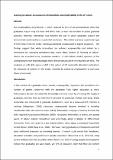Learning to labour : an evaluation of internships and employability in the ICT sector
Abstract
The employability of graduates is often reduced to lists of de-contextualised skills that graduates may or may not have and which may or may not translate to prized graduate positions. Recently, internships have become the way in which graduates acquire and demonstrate work-readiness to potential employers. This article examines a particular type of internship in the ICT sector, namely placements incorporated in degree education. The findings suggest that while internships can enhance employability and indeed be a mechanism for accessing permanent jobs, more often, instead of ‘learning to labour’, interns are expected to be productive workers. A mini labour market operates at the undergraduate level that advantages those already possessed of the required soft skills. The emphasis on soft skills signals a shift in the nature of ICT work with attendant implications for education of workers in this sector, revealed by anchoring employability to particular labour process(es).
Citation
Chillas , S A , Marks , A & Galloway , L 2015 , ' Learning to labour : an evaluation of internships and employability in the ICT sector ' , New Technology, Work and Employment , vol. 30 , no. 1 , 12041 , pp. 1-15 . https://doi.org/10.1111/ntwe.12041
Publication
New Technology, Work and Employment
Status
Peer reviewed
ISSN
0268-1072Type
Journal article
Collections
Items in the St Andrews Research Repository are protected by copyright, with all rights reserved, unless otherwise indicated.

